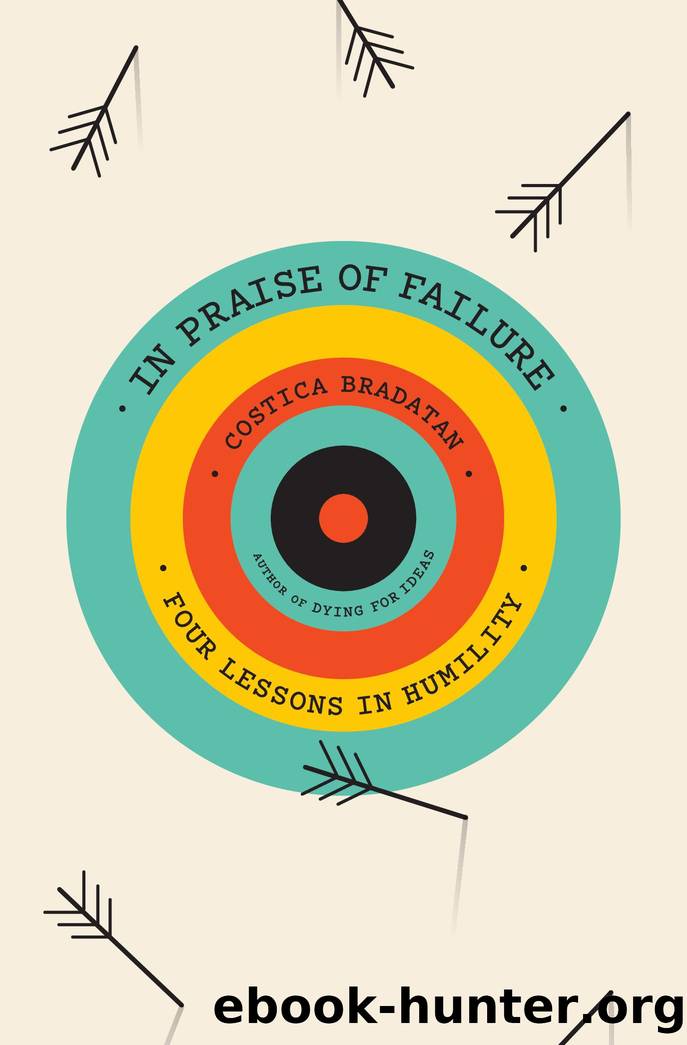In Praise of Failure by Costica Bradatan

Author:Costica Bradatan
Language: eng
Format: epub
Publisher: Harvard University Press
Losers in the Land of Success
Calvinâs reprobate, then, is the ultimate loserâthe archetype of our social failures. How we think about losers and failures today seems to be a late echo of the Calvinist doctrine of predestinationâweak perhaps, but still an echo. To an extent, the connection is genealogical. Max Weber, for one, argued strongly for such a genealogy. His classic study on the relationship between the spirit of capitalism and Protestant ethics engendered by Calvinâs theology remains persuasive.
Along with our economic type, Weber suggests, we seem to have inherited from the early Calvinists an understanding of what worldly success is, and implicitly a certain way of looking on the unsuccessful. Central to all this is a commitment to productive workâall-absorbing and all-absolving work, which translates into quantifiable wealth and visible social respectability. Since work and grace are tied together, a lack of commitment to the former can only mean the absence of the latter. âUnwillingness to work is symptomatic of the lack of grace,â observes Weber.32 The social response could be unforgiving. In Puritan New England, communities of the self-proclaimed elect (âvisible saints,â they called themselves) wanted nothing less than to expel the reprobate from their church. Since the âexternal churchâ contained both elect and reprobate, the former did not want to share even the same physical space with the latter. The presence of the reprobate could blemish the purity of the elect. For these people, writes Garry Wills, âthe only religion recognized as authentic, as what God wills, was the Covenant of Grace, under which Godâs chosen were predestined to salvation.â The others, those ânot consciously saved in this way,â could not be considered âcommunicating members of the church.â33
More important, perhaps, than a detailed genealogy of our attitudes to failure is their morphology. Fundamentally, and despite the intervening historical distance, the early Calvinists and we late capitalists employ the same patterns of thinking. Save for some niceties of language, todayâs successful relate themselves to the losers of the social and economic game not very differently from how the communities of chosen believers treated the reprobates in their midst. The same assumption of ontological damnation defines both cases: itâs who you are, and not what you do or say or think, that seals your fate.
The pattern exhibits several features: a primary need for differentiation, a good measure of self-righteousness, an obsession with purity and fear of contagion, a compulsion to exclude, a great anxiety over personal worth. Most important, in both cases there is the same postulation, through an act of societal fiat, of a group of people as âbadâ human material, something the others single out and ostracize. Should our losers happen to meet Calvinâs reprobates in the street one day, the meeting would be the least eventful of encounters. They might not even notice the other group, thinking it must be their own passing reflection in some shop window.
Elect and reprobate, successful and failure are thus chained together, like those doomed to remain in a marriage where love is absent and divorce out of the question.
Download
This site does not store any files on its server. We only index and link to content provided by other sites. Please contact the content providers to delete copyright contents if any and email us, we'll remove relevant links or contents immediately.
| Deconstruction | Existentialism |
| Humanism | Phenomenology |
| Pragmatism | Rationalism |
| Structuralism | Transcendentalism |
| Utilitarianism |
The remains of the day by Kazuo Ishiguro(8969)
Tools of Titans by Timothy Ferriss(8365)
Giovanni's Room by James Baldwin(7326)
The Black Swan by Nassim Nicholas Taleb(7106)
Inner Engineering: A Yogi's Guide to Joy by Sadhguru(6785)
The Way of Zen by Alan W. Watts(6600)
Asking the Right Questions: A Guide to Critical Thinking by M. Neil Browne & Stuart M. Keeley(5757)
The Power of Now: A Guide to Spiritual Enlightenment by Eckhart Tolle(5749)
The Six Wives Of Henry VIII (WOMEN IN HISTORY) by Fraser Antonia(5496)
Astrophysics for People in a Hurry by Neil DeGrasse Tyson(5182)
Housekeeping by Marilynne Robinson(4436)
12 Rules for Life by Jordan B. Peterson(4299)
Double Down (Diary of a Wimpy Kid Book 11) by Jeff Kinney(4261)
Ikigai by Héctor García & Francesc Miralles(4246)
The Ethical Slut by Janet W. Hardy(4242)
Skin in the Game by Nassim Nicholas Taleb(4237)
The Art of Happiness by The Dalai Lama(4125)
Skin in the Game: Hidden Asymmetries in Daily Life by Nassim Nicholas Taleb(3989)
Walking by Henry David Thoreau(3952)
